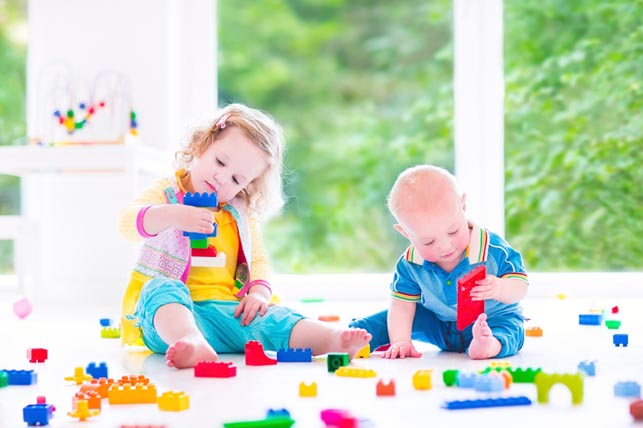
Image via: Womensforum
Supervising kids at all times is the best way to ensure they are safe, but you can’t always keep an eye on them, especially when you are a working parent. The best thing you can do to keep your fears at bay when your kids are at home without adult supervision is to child-proof your house to prevent mishaps of any kind.
If you’re ready to make your house a safe haven for your kids, but don’t know how to proceed, you’ve come to the right place! Here are some common hazards to watch out for and tips on proofing your house.
Windows
- Window screens cannot prevent falls, so be sure to have safety locks installed on all windows. If leaving windows open, keep them opened from the top if possible.
- Consider installing window guards that conform to safety standards.
- Furniture such as dressers, beds, and tables shouldn’t be placed next to windows as kids can climb on top of them to look outside or access locks.
Balconies
- Doors leading to balconies should be kept locked when kids are at home without adult supervision. Also install safety guards across all entries. If you want to allow kids into the balcony, install balcony guardrails to keep kids safe.
- Keep furniture away from the edges of balconies so that kids can’t climb onto them. Refrain from placing lightweight furniture such as plastic tables and chairs near balconies. This will discourage kids from dragging furniture near the balcony edge and climbing up on them.
Toxic Substances
- All cleaning products and medicines should be out of the reach of children.
- Medicines or chemicals placed in low cabinets and drawers should be under lock and key at all times. Also, always keep medicines in their original containers.
- Toys containing lead can cause lead poisoning, so be sure to buy only those toys that conform to safety standards. Be wary of old toys and recalled items.
Burns
- Place hot food and drinks to the back of the counter so that kids can’t reach them.
- If leaving pots on the stove, turn the handles toward the back so that kids can’t tip them over.
- Turn off all electrical appliances in the kitchen and keep them away from the reach of kids.
- Install anti-scald devices in showers and bathtubs to prevent scalding. Instruct older kids to refrain from using the bathtub when adults aren’t at home.
Electrical Shocks
- All electrical appliances should be out of the reach of children. Also, ensure that you aren’t leaving their cords dangling.
- Unused electrical outlets should be fitted with plastic caps. Do consider installing child-safety covers on all electrical outlets.
- Bind excess cords to prevent kids from chewing on them and do away with damaged cords.
- Place big appliances like television sets and stereo systems near the walls so that kids can’t reach at the back and grab wires.
Fires
- Ensure nightlights aren’t touching fabric like curtains or bed sheets.
- Always purchase flame-retardant sleepwear for kids and everyone in the household.
- Place electric space heaters away from flammable items.
- If you have a wood-burning stove or a fireplace, use screens for added safety.
- Keep matches, lighters, candles, and firecrackers away from the reach of children.
- Install smoke detectors.
Playground
- If you have a swimming pool or a hot tub, get it fenced and install a gate with a safety lock on. You can also consider keeping the pool and/tub covered when kids are at home by themselves.
- Make sure that all playground equipment you purchase conforms to safety standards. Keep checking equipment regularly for cracks, pointed protrusions, or exposed nails and fittings.
- Avoid getting a trampoline for kids; they are dangerous for kids even when adults are around supervising.
- The play area flooring should be able to cushion falls so avoid hard flooring like concrete and stone.
- Lots of plants are toxic when ingested, so refrain from growing anything without researching well.
Garden equipment like lawn mowers and chemicals like pesticides should be kept away from the play area under lock and key.
Indeed, nothing can substitute adult supervision when it comes to the safety of your kids, but if you child-proof your home well, you won’t have to worry endlessly about your little ones while you’re away at work or getting other things done.
Note that child-proofing your home has to be a continuous process. As children grow, they can be exposed to new hazards, so keep an eye out for potential dangers to ensure your kids stay safe.
About the Author
Korie Cantor has been working as a freelance writer for a long time. She has a diverse background in health and fitness and is always on the lookout for new stuff and cool freebies in this regard. She loves sharing her opinions on the latest issues affecting women.
Comments
3 responses to “Making Your House Kid-Safe: Top Tips to Read”
AS a mom of twins, I had to make sure everything was safe for the kids. When there’s a certain room that might be to dangerous for them, I scan everything first or I don’t leave them alone in that room.
It can be a lot of work making your house kid safe. It has to be done though!
Home safety is so important to our family. My husband is a Pediatrician and so often has cases come in that were the result of poisonings, falls, and even a case where a toddler fell head first into a bucket of water kept in the bathroom and sadly drowned. All these are so easily preventable and no matter how much time it takes it is well worth ensuring the safety of little ones.